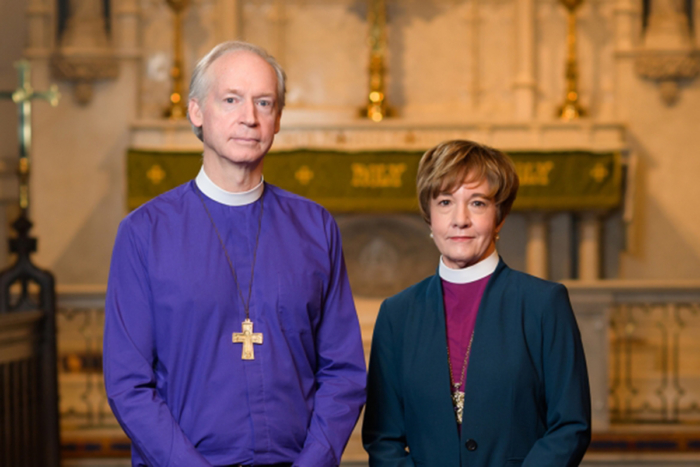North Carolina bishops condemn anti-LGBTQ+ attacks as lawmakers advance anti-LGBTQ+ billsPosted Aug 11, 2023 |
|

Bishop Sam Rodman and Assistant Bishop Jennifer Brooke-Davidson lead the Raleigh-based Diocese of North Carolina. Photo: Diocese of North Carolina
[Episcopal News Service] The Diocese of North Carolina’s two bishops released a statement this week expressing solidarity with the LGBTQ+ community and condemning attacks on people “simply for being who they are,” while the state Legislature is poised to enact a series of anti-LGBTQ+ measures.
The statement from North Carolina Bishop Sam Rodman and Assistant Bishop Jennifer Brooke-Davidson specifically opposes interpretations of Scripture used by some Christians to vilify gay, lesbian and transgender people.
“Anyone who uses the Bible to justify hate sinfully misrepresents the teaching of Christ,” Rodman and Brooke-Davidson said. “There is no place for it in our church, and we, as Christians, can neither support nor ignore it. When hatred is voiced by elected officials under the guise of faith, we must speak up, and we do so now.”
The Raleigh-based diocese includes 111 congregations in the central part of the state. The bishops’ statement does not cite any examples or oppose any specific government policies, though it comes as the Republican-controlled Legislature is considering whether to override the Democratic governor’s vetoes of three bills aimed at restricting LGBTQ+ rights and awareness.
One of the bills has drawn comparisons to the Florida law that critics have labeled “don’t say gay.” In North Carolina, as in Florida, it would prohibit elementary school teachers from discussing LGBTQ+ topics in classrooms. The other two bills relate to transgender issues. One would ban gender-affirming medical care for people under age 18, and the other would prohibit transgender girls and women from competing on sports teams matching their gender identity.
Gov. Roy Cooper vetoed all three bills over a month ago, calling them a “triple threat of political culture wars using government to invade the rights and responsibilities of parents and doctors, hurting vulnerable children and damaging our state’s reputation and economy like they did with the harmful bathroom bill.”
Cooper was referencing a bill that the Republican-controlled Legislature passed in 2016 requiring people to use public restrooms that matched their sex assigned at birth, setting off a national firestorm of criticism that prompted some sports leagues and corporations to boycott the state. The Legislature repealed the law the next year.
It remains unclear whether the Legislature will vote on possible overrides of Cooper’s vetoes of the anti-LGBTQ+ bills. North Carolina House Speaker Tim Moore said this week that lawmakers would attempt to override Cooper on Aug. 16, though he also has acknowledged “some attendance issues” this month. A veto override would require a three-fifths vote, testing the strength of the Republicans’ supermajority.
Republican lawmakers in state legislatures across the United States have proposed hundreds of anti-LGBTQ+ bills in recent years as they embrace culture war policies that are increasingly focused on limiting transgender rights and acceptance in schools, health care and other public spheres.
This year, for example, Tennessee enacted a prohibition on gender-affirming care for trans children and a separate state measure outlawing drag shows accessible by children, though the drag show measure was later ruled unconstitutional. Utah enacted its own law this year restricting the medical care available to children experiencing gender dysphoria. And in Florida, Republican Gov. Ron DeSantis, who also is running for president, signed a law in April that enacted additional educational restrictions to the ones included in the so-called “don’t say gay” law.
In North Carolina, the American Civil Liberties Union is tracking 11 bills pending in the Legislature relating to LGBTQ+ issues, most of them focused on education and health care restrictions.
Rodman and Brooke-Davidson, in their recent statement, lamented that “our LGBTQ+ siblings continue to come under attack – verbally and physical – simply for being who they area.”
“The threats to their well-being, and the denial of the dignity to which they are entitled, are unjust and immoral and put them at an exponentially increased risk of danger,” the bishops said. “They worship and serve with the rest of us, ministering with and to us in lay and ordained roles within our churches and the wider community. They are emotionally, spiritually and corporally due the same respect and safety God desires for all of us.”
– David Paulsen is a senior reporter and editor for Episcopal News Service. He can be reached at dpaulsen@episcopalchurch.org.

Social Menu